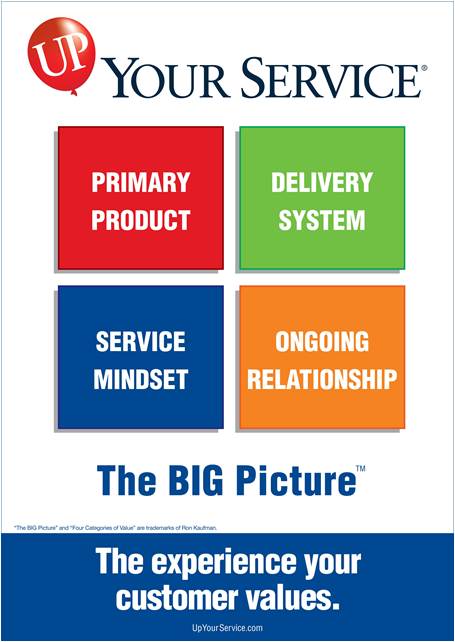A recent article in Businessweek caught my eye. Titled “Most-hated airline is also the most profitable”, the author states, “…the low-cost model rightly treats airfare as a utility. There really does not need to be a service component attached to consuming airfare.”
I believe this point of view incorrect. There IS a service component in airfare…and in every other form of service or product delivered throughout the world.
Let’s explore this together.
First, we need a solid working definition for the word service. At Uplifting Service, we define service as “taking action to create value for someone else”. There are three elements in this definition: the actions you take, the people you serve, and the value your actions create.
Next, we propose there are four major categories of value that, working together, create the customer experience; Primary Product, Delivery Systems, Service Mindset, and Ongoing Relationships. We call this diagnostic framework “The BIG Picture”, and it can be used to evaluate Spirit Airlines and any other organization, including yours.
Spirit Airlines creates value in all four categories of “The BIG Picture”.

The Primary Product (the main reason people come to you for service) is safe air travel, inexpensive airfares, unbundled product, and convenient point-to-point destinations. The Delivery System (how you get customers to your product, and product to your customers) includes on-line booking, ticketing and check-in with customer choice of seats, meals, luggage, hotels, car rentals, and a range of payment options. Service Mindset (the way you meet, greet and treat customers) includes attitude, personality, voice, tone, and gestures from ground staff and air crew. And Ongoing Relationships (extending your work with customers beyond the current transaction) includes co-branded credit cards and a frequent flyer program.
Spirit is in the Service Business
Because Spirit embraces a low-cost strategy, the airline attracts customers who are primarily interested in low fares. Yet a problem arises when customers do not understand how the airline is able to offer such inexpensive travel.
“Many of the complaints about Spirit are driven by our customers not fully understanding that we offer unbundled fares that let them control how much they spend,” said Spirit spokeswoman DeAnne Gabel. The goal, she says, is “to reduce complaints by helping customers learn about how to fly Spirit to go where they want and keep more money in their pocket.”
Spirit is on the right path with this approach to better educate customers about their services and their business model, thereby reducing confusion and complaints. From the profit standpoint, Spirit is running a very good business. From the service standpoint, they are taking steps in the right direction.
Should a low-cost airline be tagged with “service”? Absolutely. Should every business be tagged with “service”?
We think so. What do you think?



